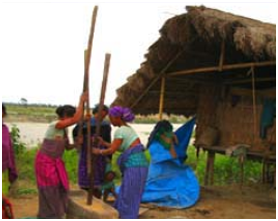About Mising Culture
The Village Community
 |
Mising villages may be big or small, depending generally on the availability of land for cultivation in the areas near by. Many big villages of earlier times (often referred to as revenue villages) have split into different neighbourhoods of a locality over the years, and the process seems to be continuing. Earlier, the chief of the village community was called a Gam, who used to see to it that customary law and security of life and property prevailed in the village. In the case of disputes between families or individuals, a Kébang, the community body, presided at by the Gam, would sit, deliberate upon and administer justice. The village Kébang may also discuss other matters of importance for the community and make decisions on the course of action that needs to be taken. During the days of the British, the Gam was replaced with a Gaonburha, an Assamese word, meaning the head of a village. A Kébang, held for hearing and resolving disputes, began to be referred to as mel (an Assamese word, meaning a gathering of the community for hearing a dispute). While many civil cases or cases relating to petty crimes may still be settled at the level of a mel, people these days mostly approach courts of law for justice in cases of both criminal and civil nature.
The institution of Mímbír-Ya:me: (literally, ‘young women-young men’), a body of youths of a village constituted by the youths at the time of community festivals, particularly on the occasion of Po:rag, the post-harvest festival, for celebrating an occasion smoothly. The Misings have a patrilineal social system, lineage being derived from one’s father. Traditionally, a daughter has no rights of inheritance of property in cash or kind, movable or immovable, except for the ornaments and clothes of her mother. If, however, a couple has no male child, their girl child/children would inherit their property. C ustomary laws in such matters are gradually yielding place to modern laws of civil societies.
Misings strictly adhere to clan exogamy. Polygamy was, and, to some extent, still is, permissible, but its practice is rare at present. Widow remarriage is allowed. C hild marriages are unknown amongst them, although boys and girls in villages marry relatively early.
|